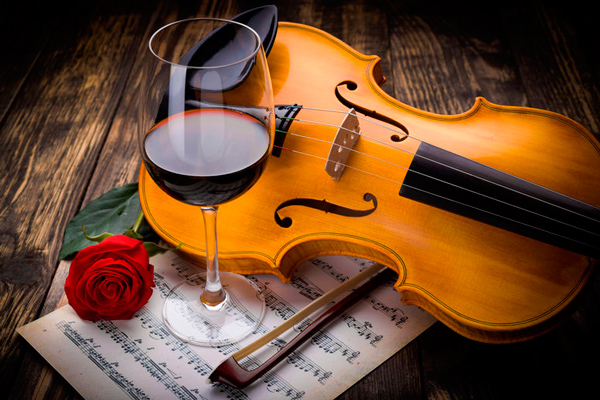What did Bach, Mozart, Beethoven, Rossini and Brahms have in common? Beyond being great classical composers, they all loved wine! Discover their favourites
Two of my greatest passions are wine and music. So I was astonished when I realised how little I’ve written about music and its relationship with wine. On Wine and Other Stories the meagre list only includes two short stories (Businessmen they drink my wine, A black fly in your chardonnay) and an article dedicated to the Italian hit “Volare”. Never fear, with this article I intend to feed my starving readers.
I like a wide range of music genres. Call me retro, but that also includes classical music. The life and times of great personalities have also always fascinated me. Therefore I decided to combine my love of wine, classical music and interesting personalities. I researched the lives of famous classical composers. In this article, I will reveal five classical composers that loved wine. Are you curious to find out the wines Mozart, Beethoven and other famous composers favoured?
Johann Sebastian Bach (1685 – 1750)
Favourite wines: wines from the Rhine valley

Johann Sebastian Bach was born in Eisenach (Germany). He came from a long line of musicians. Therefore it’s no surprise that his talent for music arose at an early stage. Strangely enough, Bach‘s contemporaries praised his mastery of the organ much more than his skill as a composer. Like many artists, Bach’s genius was only discovered long after his death.
A prolific musician, Bach had an active life even though he never left Germany. Despite the lack of international travel, he kept abreast of contemporary artistic and commercial trends especially after moving to Leipzig. At that time Leipzig was a crossroad between Eastern Europe, Middle East and the West.
During his stay in Leipzig, Bach enjoyed the fashionable drinks of his time. He was a passionate coffee connoisseur. Reportedly, he collected loads of coffee blends and brewing tools. It is unfortunate that we know slightly less about Bach’s taste in wine, though his love affair with Bacchus was undeniable. In his house in Leipzig, two entire rooms were used to store wine and spirits. One cellar was not enough, he needed two!
Bach often demanded his services to be paid in wine instead of money. He seemed to prefer wines from the Rhine Valley. In Bach’s time, the Thirty Years’ War and the battles carried out by Louis XIV would have devastated the west bank of the Rhine river. Therefore I find it unlikely Bach was able to enjoy fine wine from that side of the river. It’s more likely he drank riesling from Rheingau and spätburgunder (pinot noir) from Baden. If you have more information, please let me know and I will update my article.
My musical pick: Brandenburg Concerto No.6 in B flat, BWV 1051 – The English Concert, Trevor Pinnock
Wolfgang Amadeus Mozart (1756 – 1791)
Favourite wines: Champagne

Universally recognised as one of the most gifted Western composers, Mozart was born in Salzburg (Austria) in 1756. His fame as a child prodigy is common knowledge. He learnt to play music when he was four. At five, Mozart wrote his first composition.
Mozart was a prolific and versatile composer, excelling in pretty much all the genres of his time. Some accounts reveal that wine was a trusty companion to Mozart during long nights spent composing. It is said Mozart always had a bottle of wine on his piano to foster creativity. When he ran out of wine, he simply knocked on the wall separating his house from his neighbour’s. The latter then would bring more bottles so he could keep writing.
Mozart was a dandy of sorts. As such, he was eager to indulge in the latest trends. Champagne and oysters became very popular under the reign of Louis XV, which might explain why Mozart was so fond of Champagne. Mozart used to drink loads of Champagne during the daytime, pairing it with shellfish and sweets at the end of a meal. Not a bad way to live indeed!
In my view, Champagne wine, especially Vintage Champagne, perfectly embodies Mozart’s compositions. Classic, complex and versatile. Both Mozart’s music and Vintage Champagne exhibit a great texture combined with an outstanding clarity.
My musical pick: Le nozze di Figaro, K.492, Overture – London Philharmonic Orchestra, Sir Georg Solti
Ludwig van Beethoven (1770 – 1827)
Preferred wine: Whites from Austria (especially from Voslau and Gumpoldskirchen), Rheingau rieslings, sweet wines from Tokaji and Ausbruch

Where Mozart grew up among praise and acclaim, Beethoven conducted an existence of misery and difficulties. Abused by his father, he had a difficult career and an even worse private life. Bitter and suspicious towards friends and family, he never got married and his talent was never fully recognised while alive. In his final decades, Beethoven had to fight the worst fate for a musician: deafness.
Throughout his life, Beethoven had close contact with wine and vineyards. His family had long-standing connections with the wine trade, as both his great-grandfather and grandfather were wine merchants.
Nonetheless, Beethoven’s main connection to wine was probably due to his career as a musician. In spite of his misfortunes, Beethoven was well connected to the cultural and historical personalities of the time. He regularly hung out with the highest echelons of society. Fine wine was a luxurious commodity for Beethoven’s patrons, therefore the German composer became accustomed to a wide range of wines.
Also, Beethoven spent a big chunk of his life living just outside Vienna. Both now and then Vienna was a vibrant wine region. Wines from the capital streamed into the best Austrian bars.
The aforementioned reasons illustrate why wine became Beethoven’s favourite drink. The list of wine cherished by the composer is quite long. His favourite wines included whites from Austria (especially Vöslau and Gumpoldskirchen), german rieslings and sweet wine from Tokaji. The latter epitomises Beethoven’s musical spirit. Both classical and romantic in nature, his sound was dramatic, potent, loud and intense. All adjectives you can apply to a great example of sweet nectar from Tokaji.
Alas, moderation was not Beethoven’s forte. Heavy alcohol consumption took its toll on his health. On 26 March 1827, at the age of 56, Ludwig van Beethoven died due to a terrible cirrhosis. Even on his deathbed, Beethoven didn’t stop thinking about wine. A few weeks before his death, Beethoven asked his publisher to dispatch him a shipment of Rheingau rieslings. The wine arrived a day before his demise. Upon receiving the news he had finally received the wine, Beethoven realised he wouldn’t be able to drink it. The last words he murmured were: “Pity, pity, it’s too late”.
My musical pick: Symphony No.5 i nC Minor, Op.67 – Sydney Symphony Orchestra, Willem van Otterloo
Gioachino Rossini (1792 – 1868)
Favourite wine: Madeira, Bordeaux (Chateau Laffitte), red Italian wines

Many consider Rossini to be Italy’s greatest composer. For sure he’s my favourite, both for his melodies and adventurous life. Gioacchino Rossini was born in Pesaro, on the Adriatic coast of Italy. Charming but mischievous from a young age, Gioacchino Rossini was the embodiment of an ante-litteram Bella Vita.
In a musical career spanning only 20 years, Rossini composed 40 operas. At the age of 37, he thought he had reached enough fame and money to retire! At that point, Rossini decided to dedicate the rest of his life to his passions. If you are thinking philosophy and introspection you are definitely on the wrong path. Following Rossini’s early retirement, the Italian composer focussed on entertaining friends with sumptuous banquets and drinking the best wine around.
Gioacchino Rossini was probably the greatest gastronomer of the 19th century. Stories of his insatiable appetite and gastronomy feats abound and soon became legendary. It’s not a coincidence that there are food and drinks bearing his name such as Tournedos Rossini (a hearty steak enriched with truffles) and Rossini (a Prosecco-based cocktail).
Such phenomenal food needed wine of the same level of quality. Although I didn’t find any explicit mention, I have no doubt Rossini loved Italian reds. They are food-friendly and would pair well with the earthy and meaty food Rossini seemed to love. Dramatic and lively, these wines perfectly mirror Rossini’s masterpieces (listen to William Tell or Il Barbiere di Siviglia). Further, such reds would have been easily accessible to the composer.
What we know as a fact is that Gioacchino Rossini loved Madeira and Bordeaux. In 1864, Baron de Rothschild sent Rossini a case of grapes from his vineyard as a gift. Rossini promptly wrote back to the Baron to say thank you but at the same time kindly pointing out that “However, I am not accustomed to taking my wine in pill form”. Baron de Rothschild caught the hint immediately. The following week he sent Rossini a barrel of his best wine: Chateau Laffitte.
My musical pick: William Tell, Overture – Orchestra dell’Accademia Nazionale di Santa Cecilia, Gabriele Gemignani
Johannes Brahms (1833 – 1897)
Favourite wines: white wines from Rheingau, Sicilian wine, sweet wines (especially Marsala and Tokaji)

Another musical giant of the 19th century was Johannes Brahms. Although born in Hamburg, he spent most of his professional career in Vienna.
From childhood, Brahms explored the Rheingau area. The region had a profound impact on the composer. He came to know practically every valley and vineyard in Rheingau. Even a few of Brahms’ masterpieces were composed there.
Some of Brahms’ best friends were wine merchants who specialised in distributing white wines from Rheingau to all corners of Germany. The wines from that region were among Brahms’ favourites. If you listen to Brahms’ music that might not come as a shock. His signature was precise and structured melodies, with a classic approach and crystalline notes. The musical equivalent of German riesling!
Johannes Brahms also enjoyed tastings, taking precise notes of the wines he loved. His wine knowledge was also enriched by numerous journeys abroad. The german composer was an ardent traveller. For example, he visited Italy nine times! Brahms’ favourite Italian wine region was Sicily, and he was particularly fond of Marsala. Actually Brahms had a weakness for sweet wines. His favourite tavern in Vienna always had a barrel of Tokaji available just for him!
Like Beethoven, Brahms’ last words before dying were for wine. In 1896 the composer was diagnosed with jaundice and cancer. One year later, on his deathbed, Brahms was given a sip of a riesling from Rudesheim. Just before perishing, he whispered “ah, this always tastes good!”
My musical pick: Symphony No.4 in E Minor, Op. 98 – Berliner Philharmoniker, Claudio Abbado
Forethoughts
I found it fascinating to unveil these five classical composers that loved wine. After all, they were wine lovers just like us. I was also intrigued to discover the relationship between the musicians’ lives, the wines they loved, and how one may have affected the other. Sometimes this bond turned out to be fatal (like in Beethoven), other times joyful (such as Rossini). However, from what I could gather the relationship between these artists and wine was always intense and dramatic.

I’m thinking about writing another article on this topic but this time dedicated to contemporary musicians. I already have a few names, but if you know some interesting stories connecting wine and modern musicians, I would be glad to know the details.
Stay tuned for more stories – about wine, music and much more!

